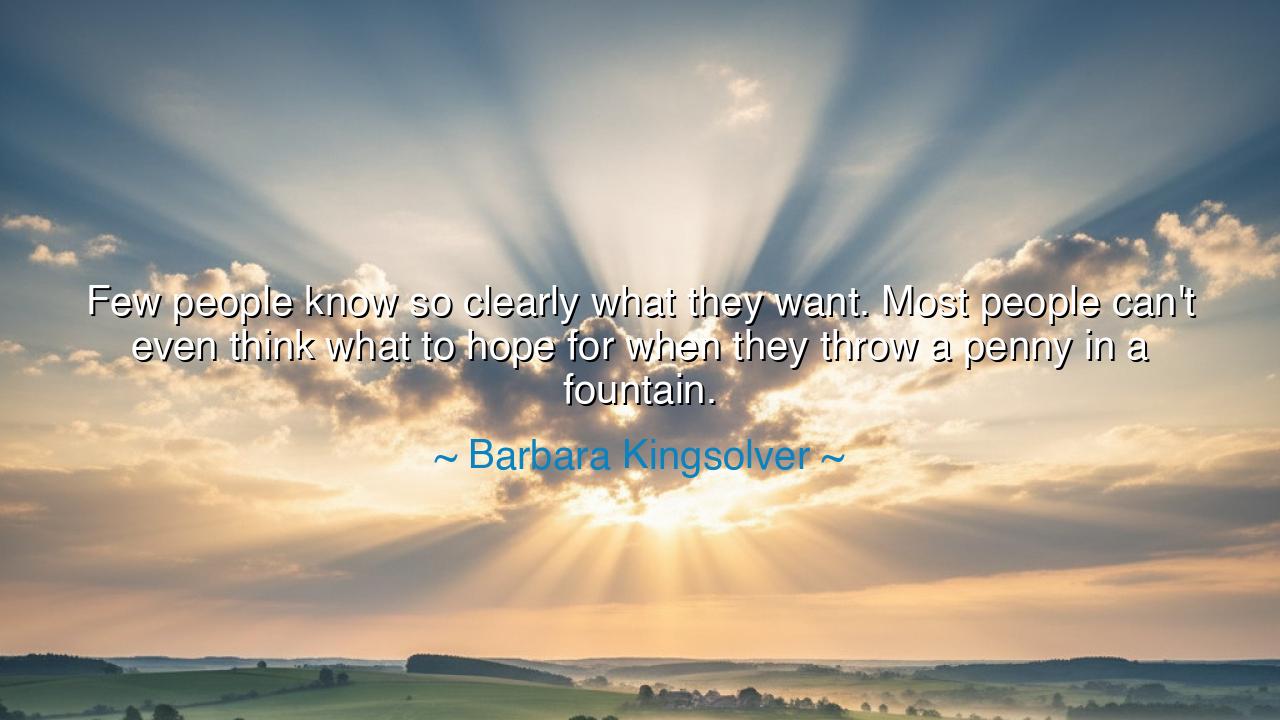
Few people know so clearly what they want. Most people can't even
Few people know so clearly what they want. Most people can't even think what to hope for when they throw a penny in a fountain.






The modern sage and storyteller Barbara Kingsolver once wrote: “Few people know so clearly what they want. Most people can’t even think what to hope for when they throw a penny in a fountain.” Though the words belong to our age, their wisdom reaches back to the oldest of teachings. They speak of a truth the ancients knew well—that clarity of desire is one of the rarest and most powerful virtues a person can possess. The one who knows what they truly seek walks through life with the steady purpose of an arrow in flight, while those who do not wander through the fog of their own uncertainty, mistaking motion for meaning.
To know what one wants is not merely a matter of ambition or preference; it is an act of self-knowledge, of deep communion with one’s own heart. The fountains that Kingsolver describes—where people toss coins and make wishes—are not just ornaments of leisure, but symbols of humanity’s eternal yearning. Yet how tragic it is, she says, that when faced with the invitation to dream, so many souls stand silent, unable to summon even a single, clear wish. This is not because life offers too little, but because modern man has become disconnected from his inner voice, drowned in noise and distraction. He hopes vaguely because he lives vaguely, never daring to look inward long enough to discern what his spirit truly longs for.
The origin of Kingsolver’s wisdom lies in her understanding of human nature and the cost of living thoughtlessly. As a novelist and environmentalist, she has long observed how people chase illusions—wealth, fame, comfort—without understanding why. Her words are not a condemnation, but a lament: that in a world overflowing with choices, clarity has become scarce. The fountain, in her metaphor, becomes the altar of our confusion—where we perform the ritual of wishing without belief, of desiring without direction. We throw our pennies not as offerings of faith, but as confessions of uncertainty.
The ancients would have called this the tragedy of aimlessness. For even in their time, philosophers warned that the unexamined life is not truly lived. Socrates declared that wisdom begins with self-knowledge. Lao Tzu taught that a person who knows others may be clever, but the one who knows themselves is enlightened. To know one’s desire, then, is not a small feat—it is the root of mastery, the beginning of freedom. History shows that all who have left their mark upon the world, from artists to prophets to reformers, shared this clarity. They knew what they sought, and so the universe conspired to guide them. Without this inner compass, the strongest ship drifts aimlessly upon calm seas.
Consider Florence Nightingale, born into comfort and privilege, yet haunted by a single vision: to heal. In an age when women were confined to drawing rooms, she defied convention, crossing war-torn fields to tend the wounded. Her will was clear, her purpose unwavering. Many around her lived well but vaguely, never daring to seek a calling beyond custom—but Florence had already found the fountain of her soul, and her wish was not for wealth or love, but for meaning. It is this kind of clarity that Kingsolver mourns the loss of in her words—the strength to name one’s purpose, even in a world that forgets how.
To hope rightly is not a luxury; it is a discipline. The ancients understood this too. They prayed not for random fortunes, but for virtues: courage, wisdom, and peace of mind. They sought not to command fate, but to align with it. Modern man, by contrast, often wishes as he lives—without direction, without reflection. Kingsolver’s message, though gentle, is a warning: that the greatest poverty is not the lack of wealth, but the lack of a dream to strive for. To live without knowing what one hopes for is to walk through life asleep, casting coins into fountains and mistaking ripples for destiny.
So, my child, if you would live fully, learn first to know your desire. Sit in silence until your soul speaks its truth, for within you lies the fountain that needs no coin. Ask not for what others expect you to want, but for what your heart burns to create. Write your hopes not on paper, but in action; shape them through effort and courage. Each clear desire is a light along the path of your becoming, and the one who follows it faithfully will never wander in darkness.
For as Barbara Kingsolver reminds us, clarity is rare, but it is divine. To know what you hope for, to name it, to pursue it with devotion—this is the essence of living, the mark of the awakened soul. The rest may cast their pennies and forget their wishes, but you, who have listened within, will need no fountain. You will become the water that flows toward its purpose, certain of its course, guided by the quiet power of knowing what you truly seek.






AAdministratorAdministrator
Welcome, honored guests. Please leave a comment, we will respond soon